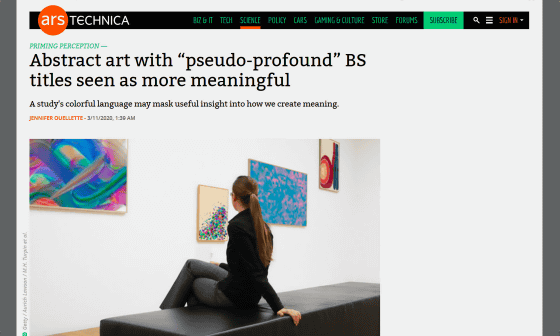Research results that evaluation is higher if an abstract painting is given a `` detailed title that looks like saying something deep ''

Bullshit Makes the Art Grow Profounder by Martin Harry Turpin, Alexander Walker, Mane Kara-Yakoubian, Nina N. Gabert, Jonathan Fugelsang, Jennifer A. Stolz :: SSRN
https://papers.ssrn.com/sol3/papers.cfm?abstract_id=3410674
Abstract art with “pseudo-profound” BS titles seen as more meaningful | Ars Technica
https://arstechnica.com/science/2020/03/abstract-art-with-pseudo-profound-bs-titles-seen-as-more-meaningful/

A research paper published by
The research team gave the abstract a 'title that seems to say something profoundly generated by a computer' and studied how this title could affect the judgment of the viewer of the abstract. The title of the dissertation 'Detaramé makes art profound' refers to the title attached to the abstract painting in the study as 'Detarame', but the research team says that 'Detaramé' He pointed out that it does not contain negative implications as commonly used.
The research team uses the term `` Bullshit '' in the dissertation as technically meaning `` computer-generated, not human-thought, It does not include imitations such as 'fake', 'not true', and 'meaningless'. It is the viewer of the work that finds meaning from the title, and the research team says that even if human intentions and thoughts do not intervene in the process of generating the title, it does not mean that the title is meaningless. Supplement.
Regarding research on `` data turtle '', the camp that `` analyzes the tendency of people susceptible to data tales and seeks ways to protect people from fake news and empty discourses '' and `` the actual effects of data turtle on human society '' Investigate the effect of ''. Turpin's research team seems to belong to the latter, and in this study he investigated the question 'How can data be useful for people trying to understand abstract art?'

In the first experiment, the research team recruited 200 undergraduates as subjects to view various computer-generated abstract drawings. Abstract paintings include those without titles and those with computer-generated `` detailed titles that seem to say something deep ''. He evaluated that he was rich. This experiment showed that subjects rated the work with a jarring title as 'more profound' than the work without the title.
In the second experiment, 218 college students were recruited to evaluate abstract paintings with 'common titles' and 'dumb titles that seem to say something deep.' 'If the value-enhancing effects of abstract paintings are specific to the title, the combination of the title and abstraction should be evaluated as more profound,' said the research team. In fact, the subject felt that the abstract painting with the 'dumb title that seems to say something deep' was more profound than the abstract painting with the 'common title'.
In the third experiment, we performed a similar experiment by mixing 'abstract paintings drawn by human artists' and 'computer-generated abstract paintings'. In this experiment, there was no difference in the effect of increasing the value of the `` detailed title that seems to say something deep '' between the abstract painting drawn by a human artist and the abstract painting drawn by a computer, It has been proven that the first and second experimental results can be applied to abstract paintings drawn by humans.

In the last experiment, Turpin's research team stated that in a `` computer-generated dazzling title that seems to say something deep, '' `` International Art English (international art English )], And examined whether the evaluation of abstract paintings changed.
International arts English uses adjectives such as `` potential '' as nouns of `` potentiality '', and terms that seemingly duplicate meanings such as `` internal psychology '' and `` external reality '' There are many things that are difficult for ordinary people to understand, such as using the abstract metaphor of `` the culmination of many small acts achieves mythic proportions '' (the mythic proportions are achieved). There is.
As expected by the research team, subjects were given other mediocre titles, as well as abstracts titled `` a dumb title that seems to say something deep '' and `` a title using International Art English '' Higher than abstract paintings.

According to the research team, `` In any field where objective evaluation is not performed using strict and specific criteria, not only abstract paintings, success is determined by how impressed others are. '' He pointed out and argued that there was no problem with giving a jarring title. Turpin believes that adding a title that looks profound to an abstract painting may increase the monetary value of the work of art.
It has also been pointed out that the fact that the subjects were all undergraduates could distort the research results, but co-author Alex Walker argued that the effects of the dashing title on abstract painting were repeatedly reproduced, `` I think the effect is very reliable and robust. ' In the future, it will be possible to study whether viewers with artistic expertise will see similar effects.
Mr Walker points out that our research is often viewed negatively: 'People think that we have a negative meaning to art because 'data has a negative meaning.' However, it is clear that in the context we speak of, 'dealame' need not have negative implications. ' He argued that, even if a person who saw a work of art with a 'de lame title' felt deep in the work, his subjective impressions and impressions were nothing wrong.

Related Posts:
in Creation, Posted by log1h_ik







